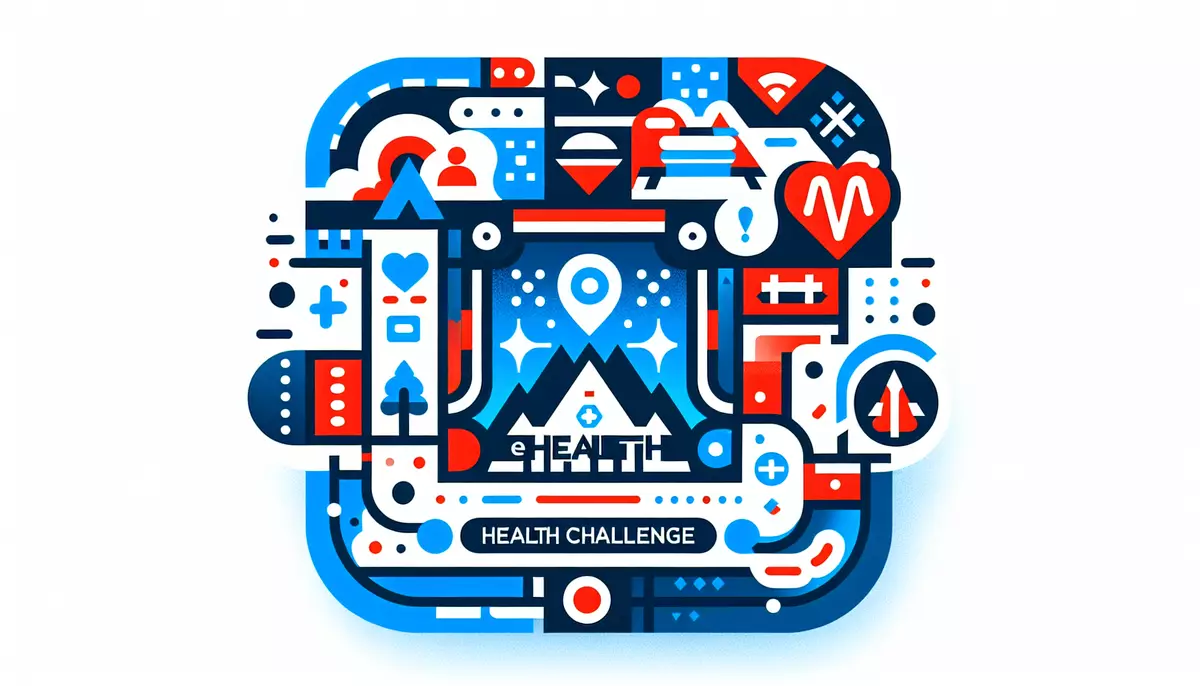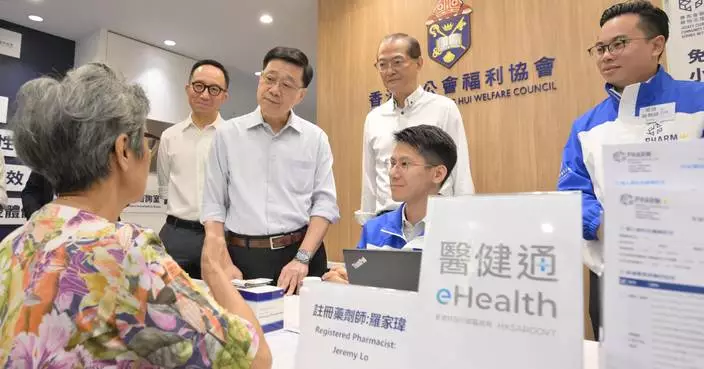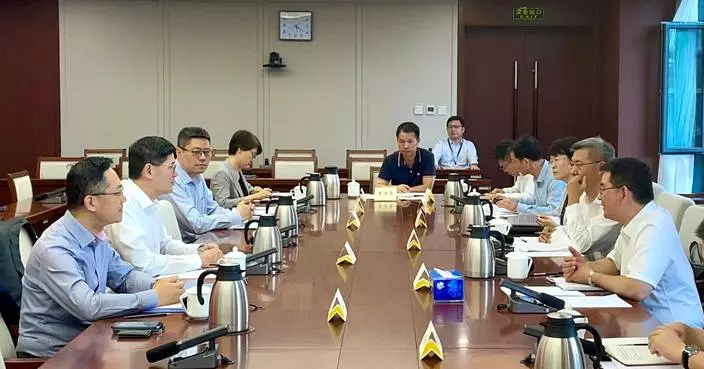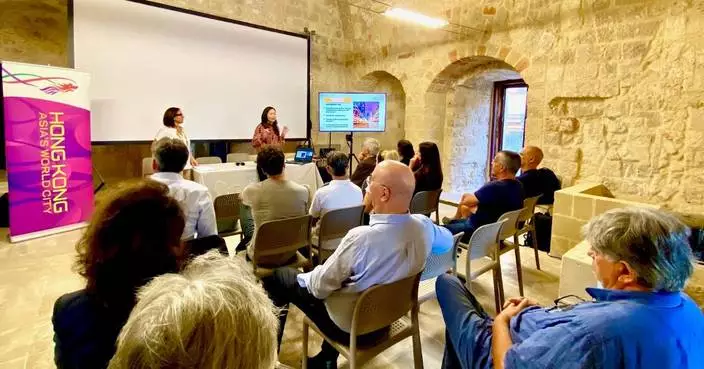Government establishes Chinese Medicine Development Blueprint Subcommittee
The Government announced today (August 30) the establishment of the Chinese Medicine Development Blueprint Subcommittee (CMDBSC) under the Chinese Medicine Development Committee (CMDC) with a view to gathering a wider spectrum of views in formulating the Chinese Medicine Development Blueprint.
The CMDBSC is tasked to make recommendations to the CMDC on concrete strategies for the overall development of Chinese medicine (CM), as well as the short, medium and long-term objectives and respective feasible initiatives for the long-term planning. Various working groups will be set up under the CMDBSC to enable more focused discussions on issues in different areas.
The CMDBSC is chaired by the Commissioner for Chinese Medicine Development of the Health Bureau (HHB). Members comprise different stakeholders from the CM sector and related sectors, with a view to fully incorporating the views of different sectors and addressing their concerns during the formulation of the Blueprint. Members of the CMDBSC include ex-officio members, Chairmen of the Chinese Medicine Practice Subcommittee (CMPSC) and Chinese Medicines Industry Subcommittee (CMISC) under the CMDC, representatives from the Chinese Medicine Hospital of Hong Kong (CMHHK) and the schools of Chinese Medicine of three local universities, and persons from the fields of CM practice, CM drugs, other healthcare professions, testing, research and development, social services and education, etc.
The two-year tenure of the CMDBSC will take effect from September 1, 2024. The membership list is as follows:
Chairman
-----------
Commissioner for Chinese Medicine Development (Dr Vincent Chung Chi-ho)
Non-official members
--------------------
Chairman of the CMPSC (Professor Chan Wing-kwong) (Note 1)
Chairman of the CMISC (Mr Tommy Li Ying-sang) (Note 1)
Convener of the Working Group on the Development of Chinese Medicine Services (Dr Liong Ching) (Note 2)
Convener of the Working Group on the Development of Chinese Medicine Industry and Cultural Popularisation (Professor Dawn Au Ching-tung) (Note 2)
Convener of the Working Group on the Development of Chinese Medicine Profession and Talent Cultivation (Professor Kenny Chung Kiu-lam) (Note 2)
Representative of the CMHHK (Hospital Chief Executive, Professor Bian Zhaoxiang)
Representative of the School of Chinese Medicine of the Hong Kong Baptist University (Professor Li Min)
Representative of the School of Chinese Medicine of the Chinese University of Hong Kong (Dr Sarah Chan Sze-nga)
Representative of the School of Chinese Medicine of the University of Hong Kong (Professor Shen Jiangang)
Professor Chair Sek-ying
Mr Chan Lin-chuen
Ms Jojo Chan Wing-yin
Mr Abraham Chan Yu-ling
Mr Chua Hoi-wai
Mr Koo Hoi-lun
Dr Kwok Tsz-kin
Mr Dominic Lam Chun-hong
Professor Cindy Lam Lo-kuen
Professor Simon Lee Ming-yuen
Professor Gilberto Leung Ka-kit
Professor Hector Tsang Wing-hong
Dr Wong Hung-ngan
Mr Nicholas Wong Lup-hoi
Ex-officio Members
--------------------
Representative from the HHB
Representative from the Department of Health
Representative from the Hospital Authority
The Chief Executive, in his 2023 Policy Address, put forward a number of policy initiatives in relation to the development of CM, including formulating in collaboration with the CM sector a Blueprint which will map out the vision and strategies for the future development of the CM sector in Hong Kong. The Blueprint, expected for release in 2025, covers a number of major areas and involves different stakeholders within and outside the CM sector, including but not limited to service development, talent training, professional development, industry development, scientific research and innovation, public education and cultural inheritance.
The Chinese Medicine Unit (CMU) of the HHB has commenced a series of stakeholder engagements since last September, including introducing to relevant advisory committees the direction in formulating the Blueprint and organising six CM development exchange sessions for stakeholders to express their views on different topics. Since the Commissioner for Chinese Medicine Development assumed office in late May, the CMU has been maintaining close contact with local, Mainland and international stakeholders through different platforms and means, including participating in or organising various activities, meetings and exchange sessions to gain an in-depth understanding of the current situation of the CM sector and interact with stakeholders, and to explore the feasibility of different development directions and initiatives.
The CMDBSC is one of the subcommittees under the CMDC which was established in 2013 and chaired by the Secretary for Health. The CMDC drives the direction and long-term strategies for the future development of CM in Hong Kong by providing recommendations to the Government on four key areas, namely the development of CM services, personnel training and professional development, scientific research and development, and development of the CM drug industry (including CM drug testing).
Note 1: The CMPSC and the CMISC are the standing subcommittees under the CMDC.
Note 2: The Working Group on the Development of Chinese Medicine Services, the Working Group on the Development of Chinese Medicine Industry and Cultural Popularisation, and the Working Group on the Development of Chinese Medicine Profession and Talent Cultivation are the working groups under the CMDBSC.
Health Bureau launches "e+ Life" health challenge platform under eHealth and officially rolls out "e+ Go to Park" game
The Health Bureau (HHB) launched the new "e+ Life" health challenge platform under eHealth and rolled out officially today (September 14) its very first health challenge, the "e+ Go to Park" game, to encourage members of the public to develop healthy habits by actively participating in health challenges. Over 100 primary and secondary school students as well as parents tried out the "e+ Go to Park" game and took part in a series of healthy activities at the launch ceremony for an energising weekend.
The Secretary for Health, Professor Lo Chung-mau, said, "Over 6 million citizens have registered with eHealth to date since its launch in 2016, accounting for nearly 80 per cent of the Hong Kong population. The eHealth mobile application (eHealth app) has also recorded more than 3.4 million downloads. We put forward the 'eHealth+' five-year plan last year to capitalise on the solid foundation of eHealth and make further enhancements through new functions with a view to better embracing the development of healthcare technologies in the future and enabling citizens to safeguard their well-being in a more effective manner for them to take up the primary responsibility for their own health. The Government is making every effort to develop the eHealth app into a single portal for citizens to manage health records of their own and their family members, gain access to health information, facilitate personal health monitoring and establish a healthier lifestyle, serving as a healthcare piggy bank for all.
"To encourage citizens to form healthy habits, the new 'e+ Life' health challenge platform is specially launched under 'eHealth+' to allow eHealth users to join various health challenges, log their daily exercises and accumulate health coins by interfacing with tracking applications. The first health challenge, i.e. the 'e+ Go to Park' rolled out today primarily targets students. According to the Student Health Service Annual Health Report for 2022-23 school year by the Department of Health (DH), around 90 per cent of students reported an insufficient level of physical activity, which in turn correlates with issues such as obesity, social and mental health among students. We hope to leverage the various game modes of 'e+ Go to Park', including individual, family, and school challenges, to encourage students to head outdoors with their parents and friends, and enjoy the fun of playing games and exercising together, thereby improving their physical and mental health."
The "e+ Go to Park" is introduced by the HHB in collaboration with the Education Bureau, the DH and the Leisure and Cultural Services Department (LCSD). Participants can access the "e+ Go to Park" game for free by logging in the "e+ Life" platform through the eHealth app. The game is set in the backstory of rescuing "Sports Babies" from outer space. Players are tasked to search for and capture different virtual characters and collectibles in real life at over 200 designated parks managed by the LCSD to replenish enough "sports energy" for fuelling the trip back home for the "Sports Babies". Players need to capture energy targets around different corners of the parks in person, allowing them to work out while gaming. In addition, a number of special edition virtual characters and collectibles featuring the celebration of the 75th anniversary of the founding of the People's Republic of China will be introduced in October for players to capture. Citizens may visit the thematic website of the eHealth app (app.ehealth.gov.hk/elife-overview) for more details of the "e+ Life" platform and the "e+ Go to Park" game.
At the launch ceremony, about 10 students debuted the dance performance for the theme song entitled "e+ Move it Up" which was specially composed for the "e+ Life" platform. Professor Lo also had a taste of the "e+ Go to Park" game and participated in activities at several sports booths together with students. The event featured a variety of entertaining programmes and health activities, including sports booths of stretching exercise, dodgebee and rope skipping, the "e+ Support Station" for weight and blood pressure measurements as well as blood sugar testing, Chinese Medicine health consultation services, and storytelling sessions with interactive picture books for children's health education.
More health challenges will be introduced on the "e+ Life" platform. Among them, the DH will roll out a walking challenge under the "10 000 Steps a Day" campaign this November to raise public awareness of the health benefits of walking, encourage people to engage in more physical activities and support their family members or friends to integrate the habit of walking 10 000 steps a day into daily life.
The Under Secretary for Health, Dr Libby Lee; Deputy Secretary for Education Mr Edward To; the Deputy Director of Health, Dr Teresa Li; Assistant Director (Leisure Services) of the LCSD Mr Henry Wong; and Acting Assistant Director of Home Affairs, Mr Gavin Yeung, also attended the launch ceremony.
"The Chief Executive's 2023 Policy Address" put forward the "eHealth+" five-year plan to transform eHealth into a comprehensive healthcare information infrastructure that integrates multiple functions of data sharing, service support and care journey management through the launch of nine new functions (including "e+ Life"). At present, parents can easily deposit, access and manage their children's health records in the eHealth App, including all records of vaccination received at Maternal and Child Health Centres since 2007 and at primary schools across the city since 2013 under the DH's Hong Kong Childhood Immunisation Programme, as well as allergies or adverse drug reactions records. Moreover, the "Child Growth Record" function of the eHealth app has adopted the updated Hong Kong 2020 Growth References to help parents monitor the growth of their children.
Citizens may register as an eHealth user online through the "iAM Smart" mobile application, or by visiting any of the 18 designated post offices, over 70 eHealth registration centres located in different districts and eHealth mobile registration stations; as well as the various District Health Centres to register as members and activate eHealth accounts. A default consent arrangement was also made on the system to register participating citizens of government-subsidised vaccination schemes with eHealth as a streamlined registration procedure. Citizens may visit the eHealth websitefor more details on eHealth registration.

Source: AI-generated images










